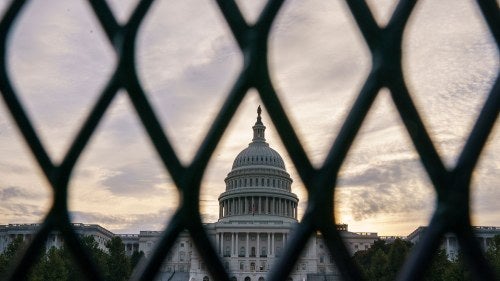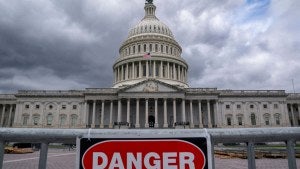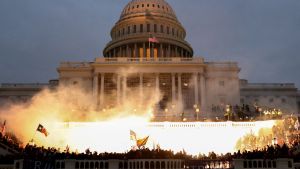Foreign Policy Experts Fear the Threat Is Coming from Inside the House

Large majorities of Democratic and Independent foreign policy elites say they are more concerned about internal threats than external ones.
The 2024 US presidential election will be hugely consequential and, depending on who wins, could have world-altering impacts. A 2022 survey of nearly 500 foreign policy opinion leaders, conducted by the Chicago Council on Global Affairs and the University of Texas at Austin, anticipated these concerns. In November and December 2022, almost two years after the insurrection of January 6, 2021, we asked a cross-section of leaders from the executive branch, Congress, think tanks, universities, and interest groups whether they were more concerned about threats outside the country or threats from within the country.
The results are eye-opening. Large majorities of Democratic (78%) and Independent (63%) foreign policy opinion leaders said they were more concerned about internal threats than external ones. These results are telling because these are professionals whose core outlook, training, and expertise are geared toward foreign policy, and both the rise of US-China geopolitical competition and Russia’s invasion of Ukraine have emphasized the more challenging nature of the international environment. Nonetheless, they identified internal threats as the greatest danger to the country.
By contrast, only three in 10 Republican foreign policy elites (29%) said they were more concerned about internal threats, with a majority (71%) instead saying they were more concerned about threats outside of the United States.
We asked these foreign policy experts to specify which internal threats they were worried about in an open-ended question. Here, the results are similarly noteworthy. Nearly all Democratic foreign policy opinion leaders (94%) and Independents (87%) identified democratic erosion and domestic political violence as a common concern. This was a catch-all category that captured post-January 6 concerns about the insurrection, as well as the rise of white nationalism, right-wing extremism, polarization, and political violence. For example, one Democratic respondent who had served in a senior role in the State Department said they were worried about “anti-democratic forces within our own population and so-called leaders.” Another Democratic respondent wrote, “I am concerned about violent factionalism, particularly that growing in the ranks of the Republican Party's supporters and even more fringe elements of the radical right.” A third Democratic respondent serving in the Biden Administration said they were worried about “home-grown attempts to erode American democracy and conduct acts of violence against fellow Americans (i.e. White Nationalists).”
While Democrats and Independents expressed more concern about internal threats, the Republican foreign policy leaders in our sample overwhelmingly cited external threats. Of the Republicans who said external threats, half (50%) named China. Another quarter (25%) referenced authoritarian regimes, or some combination of China and Russia. For example, one Republican staffer to a member of Congress wrote they were worried about “China's hegemonic ambitions.” Another Republican respondent wrote they were worried about an “expansionist China and Russia.”
Our findings on the importance of internal threats echo similar results that the Chicago Council on Global Affairs found among the mass public. In 2022, the public survey found that eight in 10 Americans (82%) were more concerned about internal threats than external ones. However, public concerns were more diverse. About 28% of the mass public identified political factors including loss of democracy as their main concern. Another 4% expressed concern about white nationalism/supremacy. About 40% of the sample identified a variety of safety and security issues including gun violence (12%), violence/domestic terrorism (8%), and terrorism more broadly (7%). And that public concern about internal threats has persisted: in its 2023 survey, the Council found a similar percentage of the public (81%) continued to be more worried about internal threats than external ones.
It is not unexpected for the public to prioritize domestic problems or issues. Foreign policy concerns are typically less salient for the mass public, except under rare circumstances such as in the wake of the attacks of September 11, 2001, or in the midst of an ongoing war that is not going well such as the intervention in Iraq.
However, it is more unusual for foreign policy experts to express such high levels of concern about domestic politics. It is a worrisome signal and portent if foreign policy elites and the public both explicitly rank domestic threats and a suite of issues related to democratic erosion, polarization, and political violence as the biggest threats facing the country. With the 2024 election looming, we imagine these concerns may become more rather than less salient. In one ominous sign, Donald Trump has suggested that there could be “bedlam” if he loses the election. Let’s hope that the country can navigate the election without foreign policy elites’ worst fears coming to pass.




Related Content
 Public Opinion
Public Opinion
More Americans consider issues like weakening democracy and political polarization to be critical threats to the United States than foreign adversaries.
 Public Opinion
Public Opinion
One year later, Americans remain divided over what happened on January 6, 2021. But they're united in concerns about future political violence.
 US Foreign Policy
US Foreign Policy
A plurality of Americans—and a majority of Republicans—also say that US leaders are not paying enough attention to US-China competition.